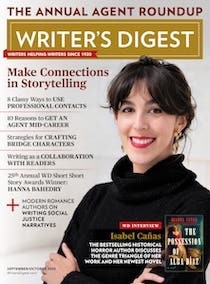Agents Talk Synopses, Literary Journals and More in Interview
I really enjoy the “Agents & Editors” series in Poets & Writers magazine. I just read the most recent article, and you should, too, because it’s here online for free. Agents sit down in kind of a roundtable discussion and talk about publishers, queries, writing and everything else.
I really enjoy the "Agents & Editors" series in Poets & Writers magazine. I just read the most recent article, and you should, too, because it's here online for free. Agents sit down in kind of a roundtable discussion and talk about publishers, queries, writing and everything else.Here are some notes from the May/June installment of this series, which features Maria Massie of Lippincott Massie McQuilkin, Jim Rutman of Sterling Lord Literistic, Anna Stein of Irene Skolnick Literary Agency, and Peter Steinberg of the Steinberg Agency. There is too much good information to really explain here, but I will share some good points that I found interesting and may be not widely known.
Synopses
Stein and Steinberg both said they hated synopses and didn't read them. Strangely enough, someone at the Boston writers' conference the other day mentioned to me that synopses are often not read by agents. This was news to me. I think that, for genre fiction especially, they are valuable. For literary fiction, where the quality of the prose is paramount, they are somewhat worthless - and Rutman actually mentioned that exact point in the article.
How Agents Find Writers
The agents talked about how they don't find fiction writers online. (Though unspoken, they may find nonfiction writers that way.) They find fiction writers in literary magazines, but even there - agents are likely too late. The consensus was that the majority of good writers getting good stuff published in literary journals were either already repped by an agent, or an agent saw the story first and just called the writer five minutes ago.
Writers Editing Their Work
All four agents had a lot to say on how writers submit work too soon. Their advice was to find brutally honest writing peers and request no positive feedback - only negative feedback. Rutman mentioned how college professors (and possibly friends and family, too) will encourage you to send it out there and get the process moving, but that is dangerous because the work is likely not ready yet.
Advice to New Middle America Novelists
Massie said: If you're in middle America and you just wrote a novel but have no idea what to do now, you should try to get great short work published in quality literary journals. Do that, and agents will flock to you.
On Switching Agents
One of the agents (unknown as to which one) remarked that this is almost always a bad idea, and that writers need to have more patience and more trust.
Chuck Sambuchino is a former editor with the Writer's Digest writing community and author of several books, including How to Survive a Garden Gnome Attack and Create Your Writer Platform.



